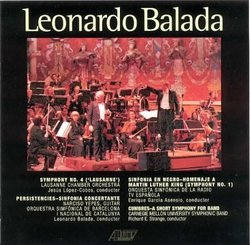| All Artists: Balada, Lopez-Cobos, Yepes, Garcia, Strange Title: Symphonies Members Wishing: 0 Total Copies: 0 Label: Albany Records Release Date: 4/9/2002 Genre: Classical Style: Symphonies Number of Discs: 1 SwapaCD Credits: 1 UPC: 034061047421 |
Search - Balada, Lopez-Cobos, Yepes :: Symphonies
 | Balada, Lopez-Cobos, Yepes Symphonies Genre: Classical
|
Larger Image |
CD Details |
CD ReviewsMajor works by a major composer - possibly one of the best-k Discophage | France | 01/12/2008 (5 out of 5 stars) "I'm starting to think that Leonardo Balada may be one of the best-kept secrets of late 20th Century music.
Not that he has been entirely ignored, on the contrary. Many CDs devoted to his music can be found today on this website. But he is certainly not viewed as one of the major composers from the last three decades of the 20th Century, and not even as one of the major Spanish composers of that era - I'd say that Cristobal Halffter takes that honor. Yet the compositions featured on this disc are extraordinary works, equal to anything written in those years. They span a period of nearly 25 years: his First Symphony, "Sinfonia en Negro - Homage to Martin Luther King" dates from 1968 and his 4th ("Lausanne") from 1992. "Cumbres - A Short Symphony for Band" (Symphony No. 2) is from 1971 and "Persistencies", a Sinfonia Concertante for amplified Guitar and Orchestra, from 1972. They are entirely contemporary in their language, yet not arcane, works of tremendous power and dramatic impact, often relying on unrelenting ostinatos of gripping intensity but also with moments of eerie mystery and striking orchestral effects of great coloristic flavor. Balada divides his compositional development in three distinct periods. From 1959 - the end of his studies at Juilliard - through 1965, he was in search of his personal voice and wrote in a variety of styles, sometimes inspired by Stravinsky's neo-classical muscularity, but always remaining defiant of twelve-tone radicalism. In 1966 began "a new and radical esthetic period", in the wake of the new, avant-garde compositional approaches of Ligeti and Penderecki, in which melody and traditional harmony were rejected in favour of pure sound-color and exploration of instrumental and orchestral textures. Around 1975, while keeping the textural approach of the previous period, he reintroduced a more traditional sense of melody and harmony in his compositions, as well as references to ethnic music. Yet, the distinction is not so clear cut when you hear the music. The 1st Symphony from 1968 dates from the more radical period but uses "ethnic" elements in the form of references to Afro-American sounds and ideas. Still, as in his 4th Symphony from 1992, those ethnic elements never appear as direct quotations, but are distorted and blended to Balada's own style. Unlike so many other attempts at cross-over and world music of all sorts, these references never sound jarring or stylistically at odds. Therefore I am admiring of- and grateful to Balada for NOT having relinquished his compositional integrity when so many others were doing so (I'll mention no-one - but I'll mention Penderecki nonetheless) and for having resisted the facile temptation to believe that impact on a public requires simplistic musical ideas. In view of the quality of his compositions, Balada's relative lack of recognition may derive from the fact that the Juilliard-trained Spaniard, who spent most of his career in the United States but acquired a US citizenship only in 1981, is difficult to enrol under a clear-cut nationalistic banner: too American to get the kind of European exposure and support that composers such as Halffter, Tomas Marco or Luis de Pablo (roughly the same age as Balada and members of the so-called "Generation of '51") got in Europe, but too Spanish (and maybe too radical and European-oriented in his language) to get the support from US institutions and recording companies. Obviously this disc is NOT for those who wish 20th Century music had ended with Howard Hanson and David Diamond and are happy with the present return to neo-Romantic tonal facility. But those who enjoy the compositions of Ligeti, Penderecki before his turn to conservatism or Lutoslawski should not miss it. The recordings date from 1971 (Cumbres, recorded at the world premiere performance in Carnegie Hall, and originally published on a Serenus LP, 12036, with other Balada works, some of which having been reissued on Leonardo Balada: The Abstract & The Ethnic) to 1999 (Sinfonia en Negro) and all sound good, with no striking sonic differences between them. " |

 Track Listings (7) - Disc #1
Track Listings (7) - Disc #1